The candidates also looked at the need for new state revenue, as well as their top priorities if elected in November.
VANCOUVER — Eight candidates for the state’s 17th and 18th Legislative District seats faced off in pairs this week at the Clark Regional Wastewater District building. The candidate forum was put on by the League of Women Voters and aired on CVTV.org.
17th Legislative District, Position 1
The 17th District, Position 1, race pits incumbent Republican Vicki Kraft against newcomer Tanisha Harris, who is running as a Democrat. Of the four races featured at the forum, theirs represents perhaps the greatest ideological difference. On addressing diversity in public employment, Kraft said policies like Affirmative Action have led us down the wrong path.
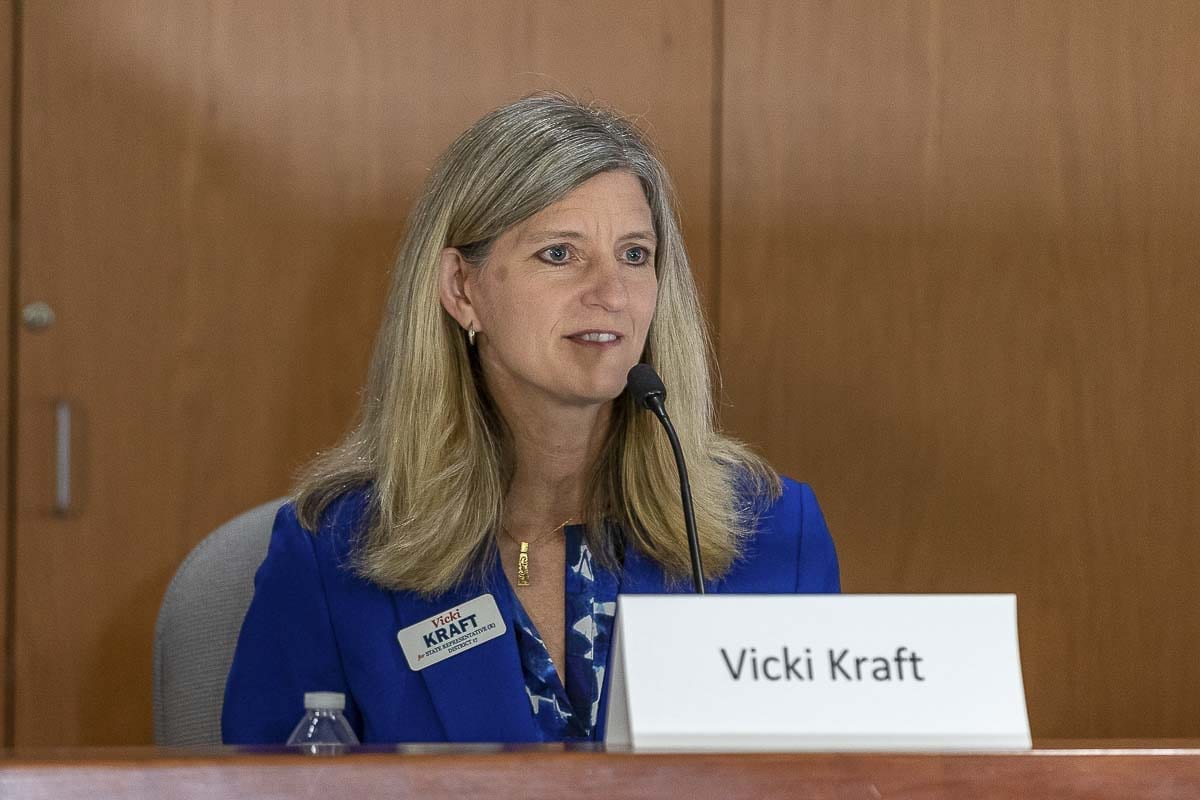
“To me, diversity is getting to a dangerous place in our nation,” Kraft said. “We’re focused so much on the differences and what makes someone unique. I would rather we start moving to the place where we can start looking at each other as people and neighbors in the community, and not see each other as the I’s and R’s and D’s on our forehead, or the color of your skin, or even really what your values are.”
Harris, the daughter of a black Baptist minister and a white Catholic woman, said she was raised to welcome anyone into her home.
“I can tell you many stories of me being a black woman running in Clark County, and the people who are opposed to that simply because I am a black woman,” Harris said. “I’m a proud, smart black woman, and whose demographics here in Clark County suggest that it’s time for diversity at all levels at the table helping make those decisions.”
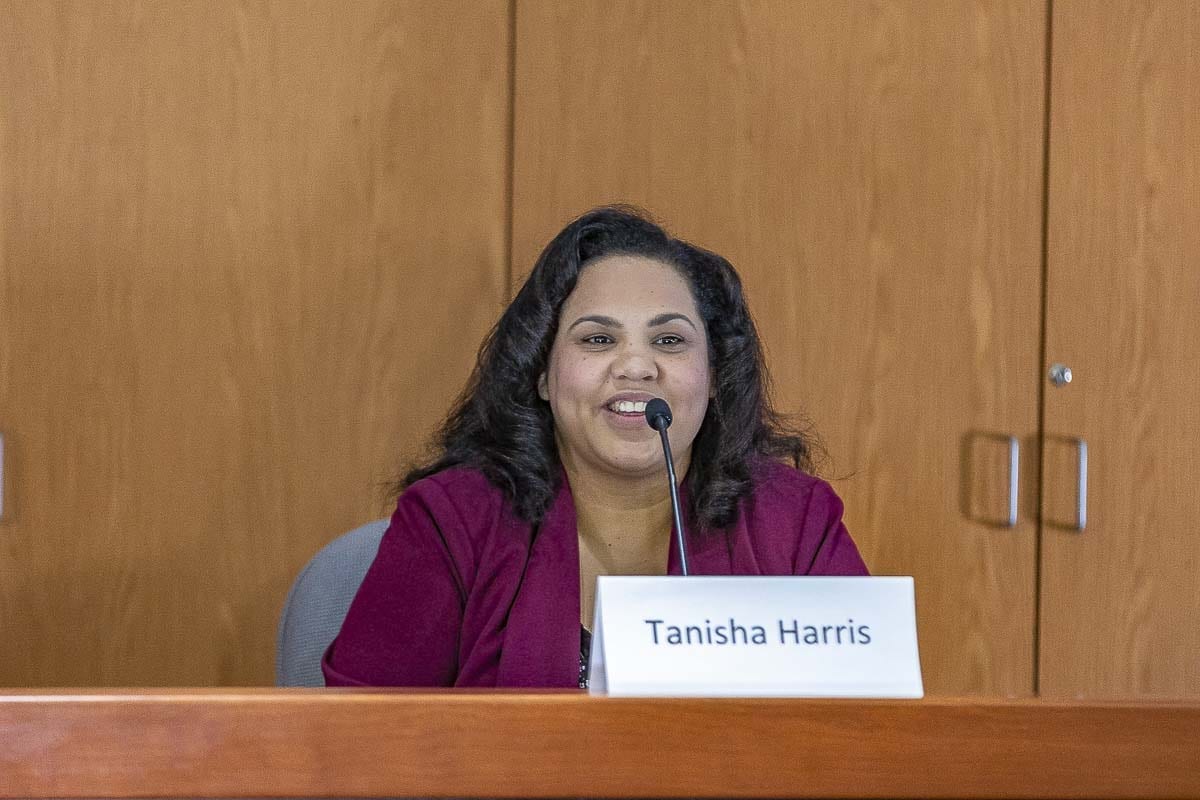
On what they’re hearing most from constituents, and what their top priorities would be, Kraft said the Interstate Bridge has come up a lot. She has been an advocate for looking at building a third bridge across the Columbia River.
“Ninety-eight percent of the time I get ‘ha ha ha’ or ‘(sigh) yes, can you do that yesterday?’ pretty much,” Kraft said. “In either case everyone wants it yesterday. So I would say transportation is a real pain point for our citizens, whether you’re local commuting or you’re having to go all the way across to Portland every day.”
On the topic of the bridge, Harris agreed it needs to be a top priority for the next legislative session.
“We missed our opportunity several years ago when the state legislature voted down a transportation budget that would have included an I-5 bridge,” she said. “We need an I-5 bridge, and we need to support public transportation by all means.”
As for her top priorities if voters send her back to Olympia, Kraft says fiscal responsibility and accountability from state government are a major goal. “We’ve been working on that and we’ll continue,” she said. “Helping our small businesses by reducing the amount of taxes and regulations … also been working on sex trafficking prevention, student achievement, certainly safety in our schools, and those are just a few things.”
Harris, who spent 10 years working for the Evergreen School District, says education is among her top priorities.
“We need people up in Olympia who have a good relationship with our school districts to focus on public education,” she said.
The issue of education funding was a popular one, and a question every candidate for state office was asked. The aftermath of the legislature’s McCleary funding fix was widespread teacher strikes, and worries by many districts that they’ll be left with unsustainable budgets in a few years.
Kraft said she would be interested in looking at the state taking control of the controversial TRI Pay that many districts pay their teachers, and possibly also moving bargaining over contracts into the state level.
“I would say it’s very prudent for, certainly, you all as taxpayers that we make sure that the money we have spent (gets) down to the local level,” Kraft said. “Now we take a look at how that needs to play out and shape up, and those local pressures need to calm for a bit.”
Harris agreed that it will take more time to understand the full effect of the way education funding is playing out. Meanwhile she said the state needs to take a hard look at special education funding.
“We don’t want another lawsuit going through the Supreme Court and having the legislature essentially having to deal with this all again,” said Harris. “So we need to come together and really work with our school districts to really put a path forward as to how we’re going to fund all of our public schools.”
On the topic of lobbyists and where their campaign donations have come from, both Harris and Kraft said they have taken money from special interests, but only ones close to their ideals. Kraft added that, in some ways, lobbyists have gotten a bad rep.
“They do play a very important educational role for legislators,” she said. “Good legislators will actually ask, ‘so tell me who’s against this bill. Tell me why I wouldn’t want to vote for this.’ And believe it or not, they will actually answer. And the ones that won’t, you pretty much just go ‘check. OK. I don’t need to spend a lot more time with you.'”
Kraft said that, while she has taken donations from special interests, she has also returned checks.
“Each of us, as a legislature, should have an open door policy, to listen to each and every single person, and should not prioritize a lobbyist over somebody else,” Harris said, “or prioritize somebody else’s values or legislative priorities because they got a check, or not.”
17th Legislative District, Position 2
The battle for the 17th District’s second seat is between four term incumbent Republican Paul Harris, and another first-time politician in Damion Giles, Sr., a 12-year Army veteran who moved to Clark County in 2004.
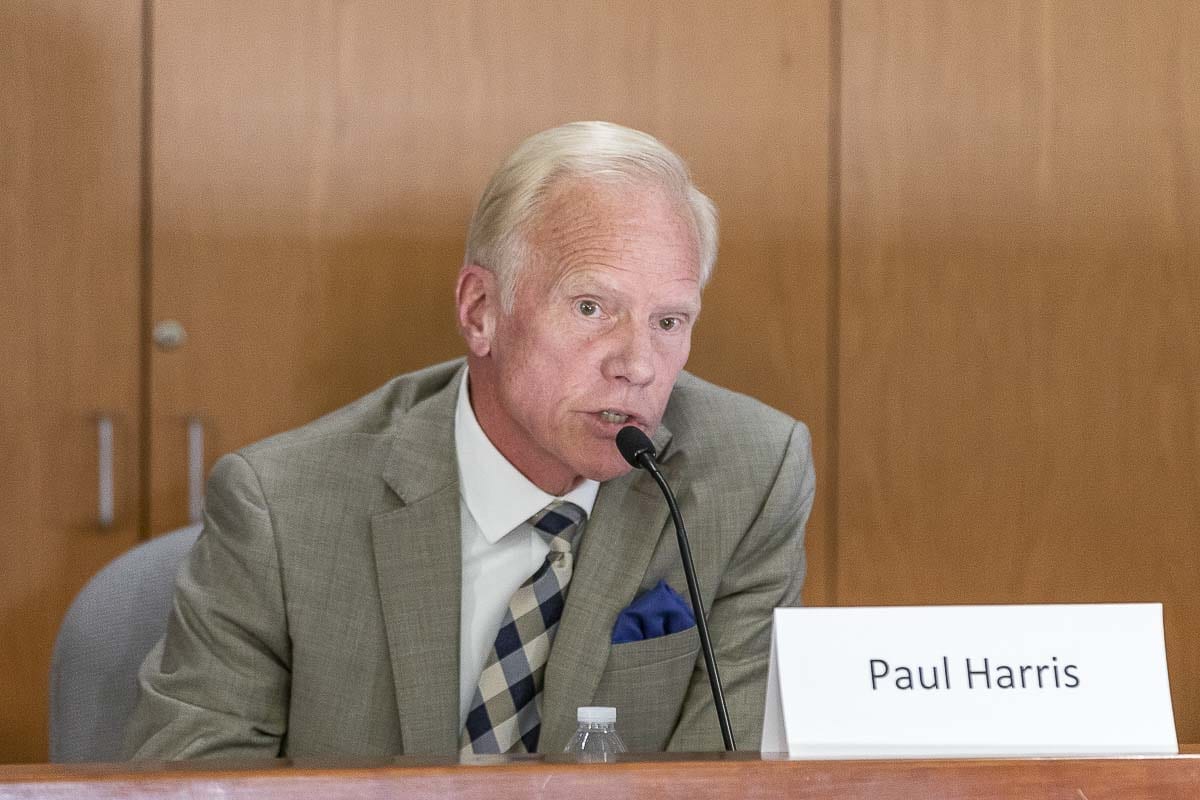
Harris has a long list of priorities, starting with a new Interstate Bridge. He is expected to sit on a new bi-state transportation committee. Harris also pointed to healthcare reform, along with homelessness and mental health as areas of focus if he is re-elected.
Giles, who has a daughter at WSU Vancouver, said education would be his top priority. Especially a focus on increasing access to skilled trade programs for students not attending a four-year school, in order to build better paying jobs in Clark County.
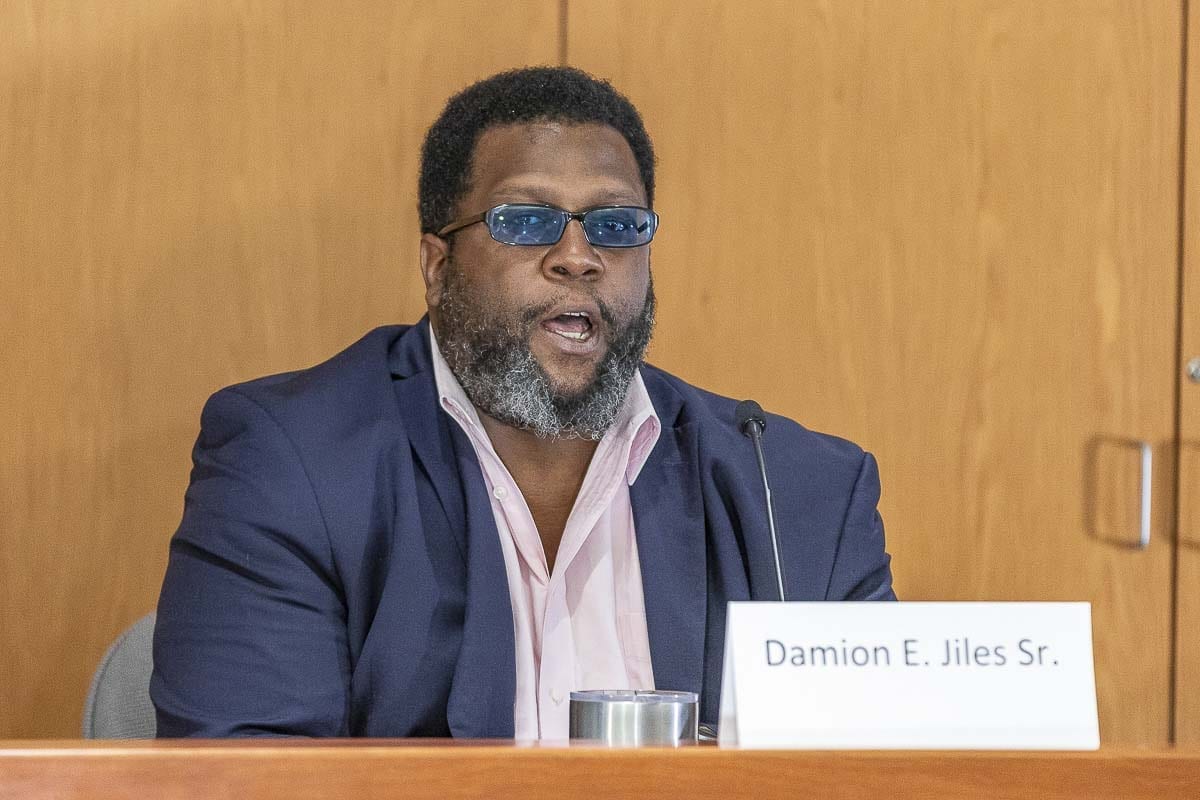
While education funding wasn’t on the original list of questions for the candidates, moderator Ellie Hutton slipped it in at the end.
“This is my favorite, favorite question!” quipped Harris, who clearly is tired of answering the question.
“I hired superintendents who make a lot of money,” said Harris, “and they need actually take a look at the money we sent them, when we sent it for allocation purposes only, and they need to do the right job, allocate the money right, and not cause a McCleary II.”
On whether management of TRI Pay should be moved to the state level, Harris unequivocally said yes.
“If we allow TRI to continue to grow, and grow, and grow — if you understand what the McCleary case was about was disparity between different districts — and if certain districts can afford more TRI than another district, then I’m going to have disparity,” Harris said. “And if I have disparity, then I’m going to have inequities. And if I have inequities, then I’m going to have a McCleary II.”
Gilles said he would prefer to see local districts maintain more control over how they budget, but said the legislature needs to continue looking at how education is funding, because it is a moving target.
“I believe school budgets should continue to be monitored, and raises given accordingly, and make the necessary adjustments to the education line item in the budget,” said Giles.
On the issue of taxes, and whether more revenue was needed, Harris said the state will have a billion dollars more in its coming budget.
“I guess the question you have to look at yourself and ask is ‘do I need more than a billion dollars?’” Harris asked, while adding that reforms to the troubled Western States mental health facility could run in excess of $600 million. Raising medicaid reimbursement rates to medicare levels in order to increase access to care would likely run another $100 million.
“My job to you is to not overtax you, and then not provide services that you don’t want me to provide,” said Harris.
Giles said he believes the state can live within its current revenue levels, but that better examination of how things are budgeted may be necessary, and the state needs to be ready for when the economy inevitably takes a step back.
“Even though we may have that billion, in today’s dollars that’s really not a lot of money when you’re talking about the state budget,” Giles said. “That money has to come from somewhere. Do I believe it should come off the backs of citizens or out of your pockets? No. But it has to come from somewhere, and that’s what we need to take a look at.”
One area Giles said he would look at spending more money is in mental health treatment, especially at the school level. It was an idea his opponent agreed with.
“The lack of facilities, locally, is terrible,” Harris said. “We need to bring that back so that if you have a loved one who is actually in need of mental health services that we have the service here that can handle that, and that you can go visit them.”
Both candidates also seemed to agree about expanding access to healthcare statewide, although Giles espoused a more broad expansion of coverage.
“We do need to take a look at some form of healthcare that will provide comprehensive coverage for all of our citizens,” said Giles. “Not at just a baseline level for putting a band-aid on the issue when you really need the problem fixed.”
On the controversial Open Public Records law, Harris said he voted for a bill later overturned by the governor that would have exempted the legislature.
“This is not that I want to hide anything, but I do believe that we need to have a policy that will make these records open to you, but then also protects you,” Harris said, adding that he interacts with a lot of citizens trying to navigate the state’s health and mental treatment system. Harris says he was concerned that the Open Records law could have exposed emails and health information about his constituents. He said if the legislature comes back with something that has protections for citizens, he would support it.
“If I’ve got nothing to hide, then there’s no reason for my record not to be disclosed,” said Giles.
Legislative District 18, Position 1
The 18th District, Position 1, is currently held by Republican Brandon Vick, who is looking for his fourth term. He is challenged by Chris Thobaben, another political newcomer and former Marine who is now a private business owner working in autonomous systems for disaster areas.
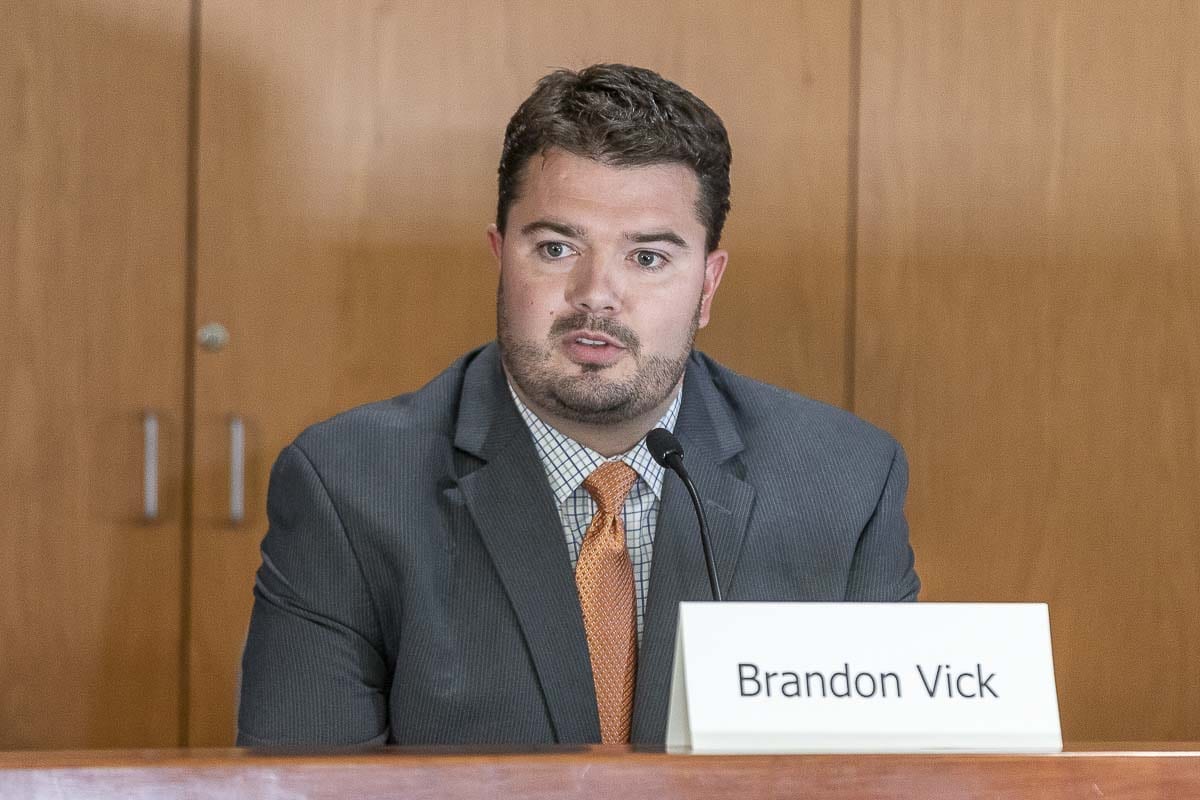
Much of what Thobaben said in response to the questions harkened back to that tech background, with a penchant for using technology and data to address problems.
“We will invariably meet a hard time. We cannot be subservient to the global economies, we have to make our fortunes here,” Thobaben says. “That means we have to make the economy of tomorrow with the technology that sells from here to somewhere else, rather than trying to buy it here.”
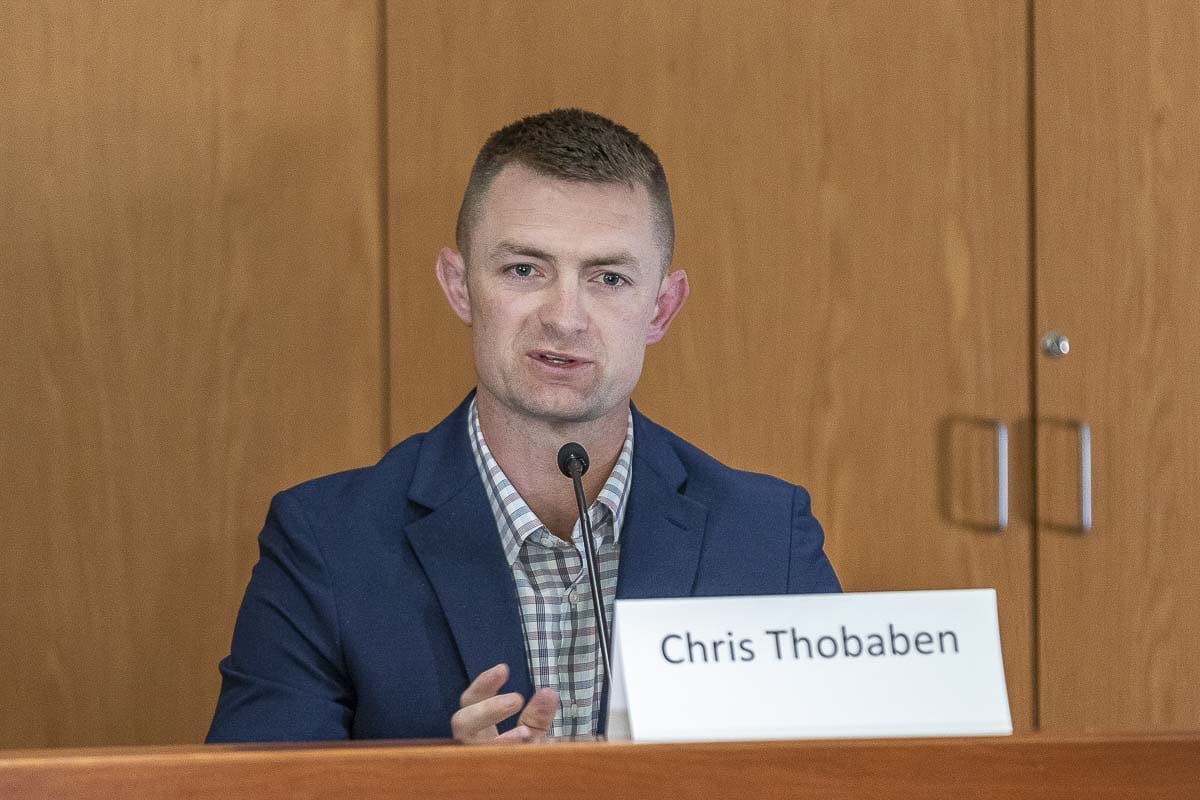
That philosophy plays into his theory around replacing the Interstate Bridge too. Thobaben says he would urge using the project to bring in autonomous vehicle manufacturers to the area.
“We have an opportunity to have an autonomous lane, a rail lane, and a bus lane to be part of our bridge project,” says Thobaben. “That tells the world that if you are company that makes autonomous vehicles and want to make more efficient transportation for senior citizens, people of lower socioeconomic means, we want you to make your headquarters here, make your businesses here.”
Vick, who also sits on the bi-state transportation committee, said conversations about a new bridge are already ongoing.
“The governor said something the other night that I do not approve of, and we’ll address that later,” he said, likely referring to Governor Kate Brown’s comment that she would require light rail on the new bridge before Oregon would come back to the table.
“Really what we have to do is what we’re doing now,” Vick said. “We’re sitting down and we’re setting out a process. And that process right now is kind of open-ended, but it’s how do we arrive at a project, and what is the best project moving forward.”
On the issue of education funding, Thobaben again said the state needs to look into using new models of statistic and data tracking to see where money is being spent effectively, and where it isn’t.
Vick said it’s his belief that the Washington Education Association planned to strike no matter how much extra money the state gave them, but said it’s clear the state has more work to do when it comes to keeping up with how modern education is funded.
“Education changes on a daily basis,” Vick said. “When I was in school we didn’t have clothing pantries and food pantries, and psychologists and suicides to the extent that we have today.”
As for how districts will handle feared budget deficits, Vick says voters need to be aware that attempts are already underway to increase the state’s $8.3 billion basic education budget by yet another $1 billion next year.
“Be worried. Your superintendent of public instruction proposed an eight percent capital gains tax, along with a local levy raise at 22 percent of the total budget,” said Vick. “That’s unacceptable, and as constituents we have to be vigilant about that.”
On the question of the state’s capital budget, and whether it will be enough to do what needs to be done, Vick said it’s simply a matter of focusing on return for investment, citing examples like the Vancouver Waterfront, Ridgefield Sports Complex, and the upcoming Battle Ground water access project.
“The people we hear from every day telling us their problems are the people that have the most money and the most influence,” said Thobaben. “So we need to make sure as we identify priorities we listen to the statistics around the homeless population, our significant mental illness challenge, our education challenges that are before us in the 21st century.”
On the issue of mental health treatment, Vick diverged somewhat from his colleague in the 17th District.
“My position on Western State actually is that we don’t fix it,” he said. “We sell it to McMenamins and let them turn it into a restaurant.”
Instead, Vick said he would focus more investment into local treatment programs, and mental health clinics at area schools. Thobaben said full board mental health treatment will be costly, but an investment worth making.
“We have to increase capacity for care, we have to provide wraparound care,” he said. “This will be expensive on its face value, but the amount of money that we will save providing wraparound care to our mentally ill and those having a psychotic event will grossly overwhelm the amount of money we’re spending in our prison system, in our police response, and our judicial.”
18th Legislative District, Position 2
The 18th District, Position 2 seat pits two relative political newcomers against each other. Kathy Gillespie, running as a democrat, is a former newspaper reporter and editor, and was director of the Vancouver Schools Board of Directors until stepping down to run for the seat left open by the retiring Liz Pike of Camas. Larry Hoff, running as a Republican, is a former CEO of Fibre Federal Credit Union.
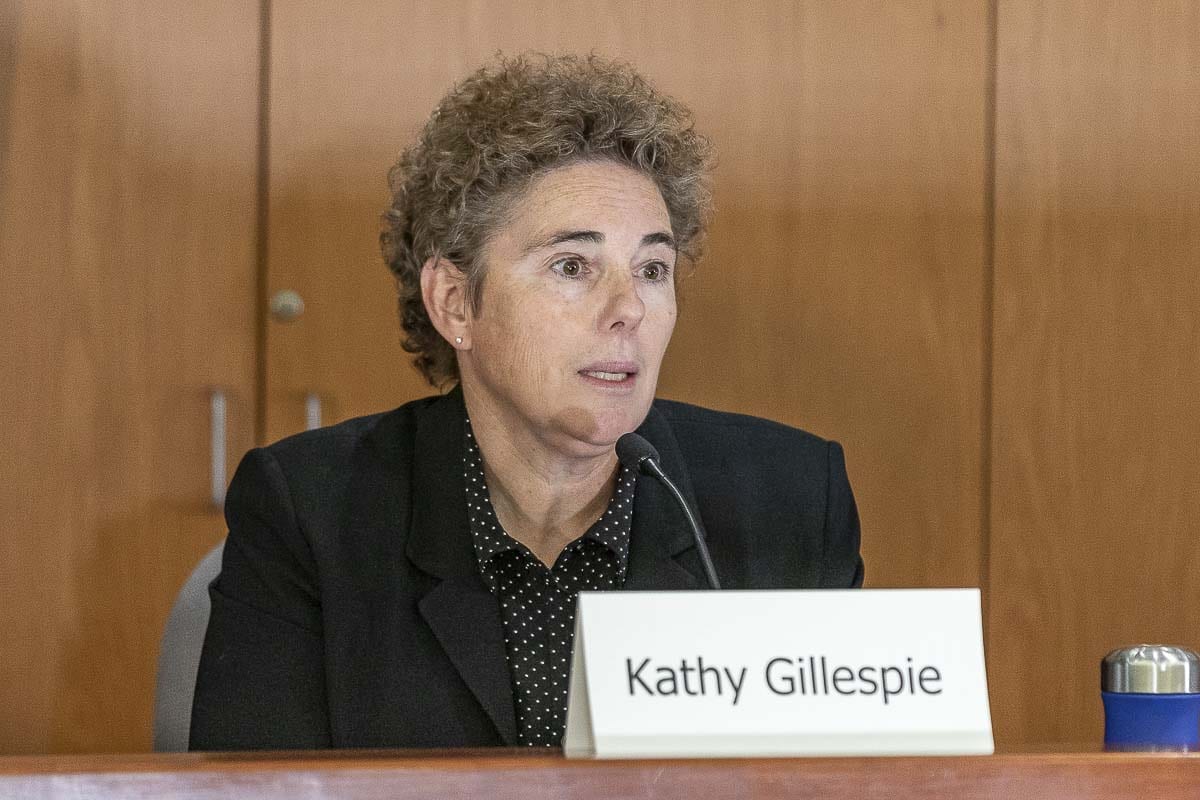
Asked what concerns she hears most from people while campaigning, Gillespie said most people talk about wanting to see a restoration of trust between elected officials in state government. Hoff said transportation is the main issue he hears about, and would be a key focus of his if he’s elected.
About the McCleary funding bill, both said they would like to give things a little more time before making any major changes.
“Any time you have legislation of that magnitude, there has to be course corrections,” said Hoff.
Gillespie said she would be open to looking closer at having the state take over TRI Pay from the districts.
“I’m really open, as a former school board director, to hearing more about reform to that particular aspect,” she said. “Because that is a place where school districts can get into a lot of trouble.”
Back on the topic of the Interstate Bridge, Gillespie echoed some of her fellow Democrats in calling for a new span that includes mass transit.
“I think the state’s obligation is to be a champion for the project,” she said. “To be aspirational in our vision for the project, to deliver a project that maximizes value for taxpayers, and delivers exactly what we say it will in the time that we say it will deliver.”
For his part, Hoff said even a shiny new bridge along I-5 isn’t going to take care of the commuting nightmare many people face on a daily basis.
“We need to take a look at all those choke points in Oregon, as well as begin the planning for a third and fourth bridge,” Hoff said.
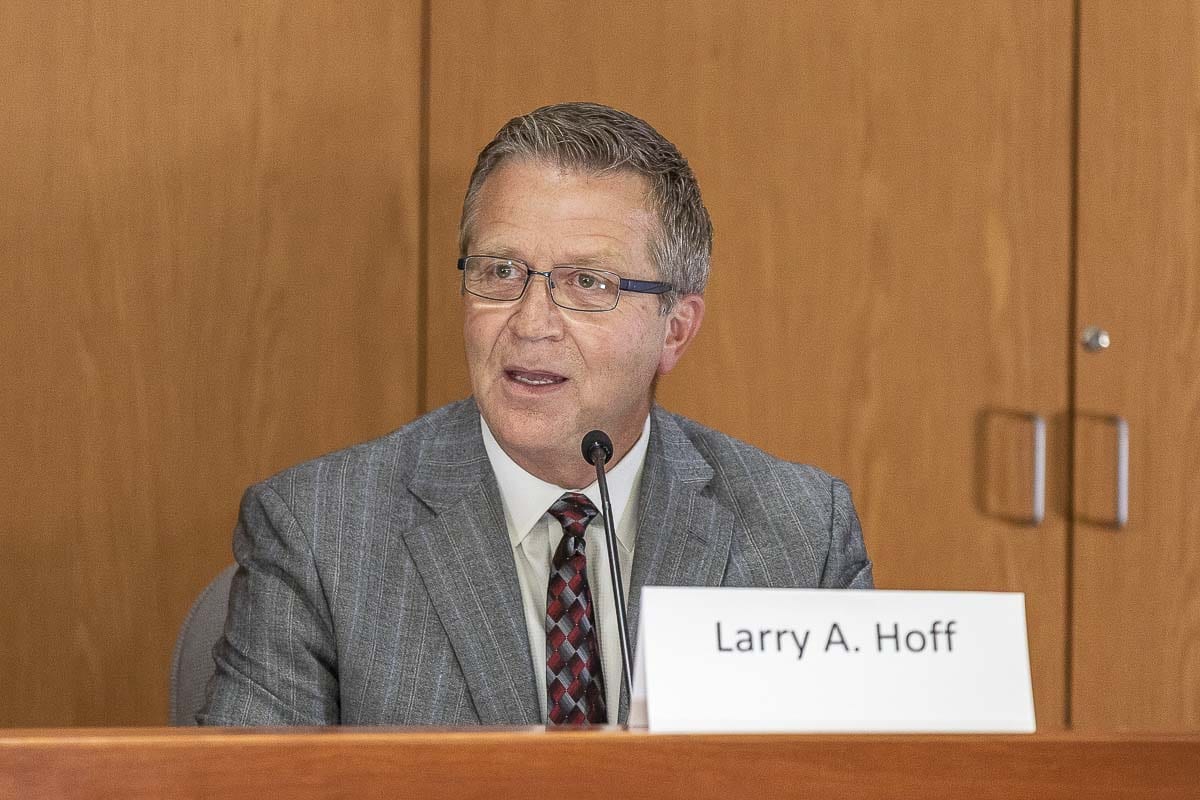
Asked whether they thought Washington state needed to raise taxes in order to pay for needed programs and infrastructure, both candidates said no.
“How many of you have enough income to handle everything you want?” Hoff asked the audience. “It just doesn’t happen.
“We don’t have a revenue problem in the state,” Hoff added, “we have a spending problem.”
Gillespie was more nuanced in her response, but agreed that the state needs to learn to live within its means.
“I think government needs to demonstrate to the people of the state of Washington that we can maximize the money that taxpayers send,” Gillespie said. “That we can deliver tangible results on what we promised that we’ll do.”
She did add that she would be open to looking more closely at the state’s tax system, to see if there are exemptions or loopholes that could be closed, before looking at the possibility of raising any new taxes.
“We do have a backlog with school construction needs, and we also have some problems with those formulas,” said Gillespie of the state’s capital construction budget. “Base allocations and construction costs are out of date, and we need to address those.”
“I’m sure there’s some bike trails or something that would be gorgeous in an area,” Hoff agreed, “but if indeed there’s a water system that needs help, that’s how you prioritize these.”




